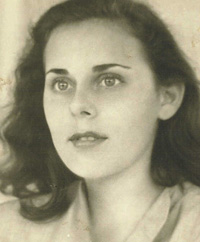UT Austin’s Ransom Center acquires Probst Solomon papers
This week the Harry Ransom Center in Austin, Texas–which houses one of the largest humanities collections in the world–announced the acquisition of the papers of Barbara Probst Solomon (b. 1928), a long-time friend and ally of the Spanish Republic and the Lincoln Brigade. The collection includes manuscripts, correspondence, published books, first drafts, interviews, documentaries and photographs.
In 1948, Solomon and Barbara Mailer (the sister of Norman Mailer) were instrumental in the rescue of two Spanish students being held in Cuelgamuros, a Francoist camp where they were used as slave labor to build Francisco Franco’s future tomb, The Valley of the Fallen/Valle de los Caídos. One of the students, Nicolás Sánchez Albornoz was the son of the historian Claudio Sánchez Albornoz, the president of the Spanish Republic in Exile. Solomon and Paco Benet, brother of the Madrid novelist Juan Benet, spent five years together, mainly in Paris, where Benet and Solomon edited the resistance magazine Peninsula together.
From the press release:
Solomon’s career as a writer began shortly after her graduation from Dalton High School in New York City. Bypassing college, Solomon moved to postwar Paris, where she met Spanish students who would later form the resistance movement to Francisco Franco’s dictatorial rule of Spain, which began during the Spanish Civil War.
While in Spain, Solomon provided American newspapers with information about the conflict that the papers could not obtain on their own. Her archive includes materials related to her time in Spain during the Franco regime and her role in the resistance movement. In Paris, she and her lover Paco Benet founded the literary magazine Peninsula, which was anti-Franco and anti-Stalinist. Included are letters describing conditions in Spain from the Catalan Socialist leader Josep Pallach and José Martínez, the publisher of Ruedo Ibérico.
Solomon became a notable voice of the 20th-century New York intellectual scene at a time when few women were featured in prominent literary and news publications. Her manuscripts form an integral part of her archive. Her books, including the novel The Beat of Life (1969) and her memoir Arriving Where We Started (1972), have received critical praise, and her memoir was heralded as “the best, most literary account of the intellectual resistance to Franco” when it won the Pablo Antonio de Olavide prize in Barcelona. Her documentary When the War Was Over (1999) contained footage she shot in Europe in 1948 and won the Lancelot Law Whyte Award.
She remains a prolific writer of memories, essays and articles appearing in The New York Times, The Wall Street Journal, The New Yorker, Harpers, Vogue, Partisan Review and the Los Angeles Times. She has been a longtime correspondent of Cambio 16 and El País.
Solomon is the publisher and editor of the literary journal The Reading Room, which she launched in 2002 with Norman Mailer, Daphne Merkin, Juan Goytisolo, Larry Rivers and Saul Bellow.
Solomon’s archive offers an important snapshot of 20th-century history and culture. Solomon corresponded extensively in English, French and Spanish with close friends, and the archive reflects her strong connections with other intellectuals and writers of her time. Solomon had a lifelong friendship with Norman Mailer, and letters and other materials relating to Mailer’s life and works are present. She had a long affair and close friendship with American novelist and screenwriter Clancy Sigal, and her collection contains extensive correspondence about their writings and lives. Mailer’s and Sigal’s archives both reside at the Ransom Center.
Other Ransom Center writers featured in her correspondence include James Purdy, Ron Christ, Daniel Stern, Lillian Hellman and Elizabeth Hardwick. The archive also includes correspondence from notable literary figures and intellectuals such as Larry Rivers, Helen Frankenthaler, Kurt Vonnegut, Phillip Roth, Saul Bellow, Diana Trilling, Cynthia Ozick, Juan Goytisolo, Daphne Merkin, Juan Benet, Carolyn Kizer, George Kirsten, Julia Kresteva, Jakov Lind, Renée Amzallag and Stanley Crouch.
Solomon was married to the late law professor Harold Solomon. She resides in New York and has two daughters from their marriage and four grandchildren. She is currently finishing her memoir “Love in the Time of Chaos-Notes of Our Time.”
Solomon’s archive will be available for research once processed and cataloged.
More about Probst Solomon in El País.















